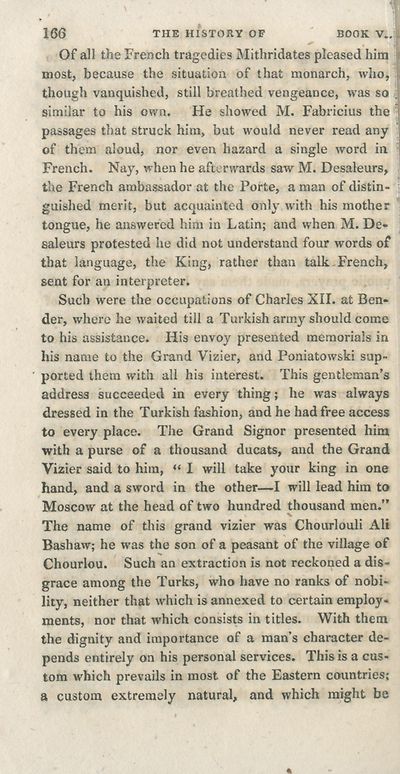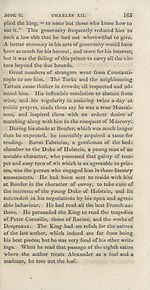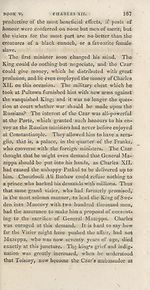Download files
Complete book:
Individual page:
Thumbnail gallery: Grid view | List view

166 THE HISTORY OF BOOK V..1
Of all the French tragedies Mithridates pleased him
most, because the situation of that monarch, who,
though vanquished, still breathed vengeance, was so
similar to his own. He showed M. Fabricius the
passages that struck him, but would never read any
of them aloud, nor even hazard a single word in
French. Nay, when he afterwards saw M. Desaleurs,
the French ambassador at the Porte, a man of distin¬
guished merit, but acquainted only with his mother
tongue, he answered him in Latin; and when M. De¬
saleurs protested he did not understand four words of
that language, the King, rather than talk French,
sent for an interpreter.
Such were the occupations of Charles XII. at Ben¬
der, where he waited till a Turkish army should come
to his assistance. His envoy presented memorials in
his name to the Grand Vizier, and Poniatowski sup¬
ported them with all his interest. This gentleman’s
address succeeded in every thing; he was always
dressed in the Turkish fashion, and he had free access
to every place. The Grand Signor presented him
with a purse of a thousand ducats, and the Grand
Vizier said to him, “ I will take your king in one
hand, and a sword in the other—I will lead him to
Moscow at the head of two hundred thousand men.”
The name of this grand vizier was Chourlouli Alt
Bashaw; he was the son of a peasant of the village of
Chourlou. Such an extraction is not reckoned a dis¬
grace among the Turks, who have no ranks of nobi¬
lity, neither that which is annexed to certain employ¬
ments, nor that which consists in titles. With them
the dignity and importance of a man’s character de¬
pends entirely on his personal services. This is a cus¬
tom which prevails in most of the Eastern countries;
a custom extremely natural, and which might be
Of all the French tragedies Mithridates pleased him
most, because the situation of that monarch, who,
though vanquished, still breathed vengeance, was so
similar to his own. He showed M. Fabricius the
passages that struck him, but would never read any
of them aloud, nor even hazard a single word in
French. Nay, when he afterwards saw M. Desaleurs,
the French ambassador at the Porte, a man of distin¬
guished merit, but acquainted only with his mother
tongue, he answered him in Latin; and when M. De¬
saleurs protested he did not understand four words of
that language, the King, rather than talk French,
sent for an interpreter.
Such were the occupations of Charles XII. at Ben¬
der, where he waited till a Turkish army should come
to his assistance. His envoy presented memorials in
his name to the Grand Vizier, and Poniatowski sup¬
ported them with all his interest. This gentleman’s
address succeeded in every thing; he was always
dressed in the Turkish fashion, and he had free access
to every place. The Grand Signor presented him
with a purse of a thousand ducats, and the Grand
Vizier said to him, “ I will take your king in one
hand, and a sword in the other—I will lead him to
Moscow at the head of two hundred thousand men.”
The name of this grand vizier was Chourlouli Alt
Bashaw; he was the son of a peasant of the village of
Chourlou. Such an extraction is not reckoned a dis¬
grace among the Turks, who have no ranks of nobi¬
lity, neither that which is annexed to certain employ¬
ments, nor that which consists in titles. With them
the dignity and importance of a man’s character de¬
pends entirely on his personal services. This is a cus¬
tom which prevails in most of the Eastern countries;
a custom extremely natural, and which might be
Set display mode to:
![]() Universal Viewer |
Universal Viewer | ![]() Mirador |
Large image | Transcription
Mirador |
Large image | Transcription
| Antiquarian books of Scotland > Kings & rulers > History of Charles XII, King of Sweden > (184) |
|---|
| Permanent URL | https://digital.nls.uk/115023218 |
|---|
| Description | Thousands of printed books from the Antiquarian Books of Scotland collection which dates from 1641 to the 1980s. The collection consists of 14,800 books which were published in Scotland or have a Scottish connection, e.g. through the author, printer or owner. Subjects covered include sport, education, diseases, adventure, occupations, Jacobites, politics and religion. Among the 29 languages represented are English, Gaelic, Italian, French, Russian and Swedish. |
|---|

